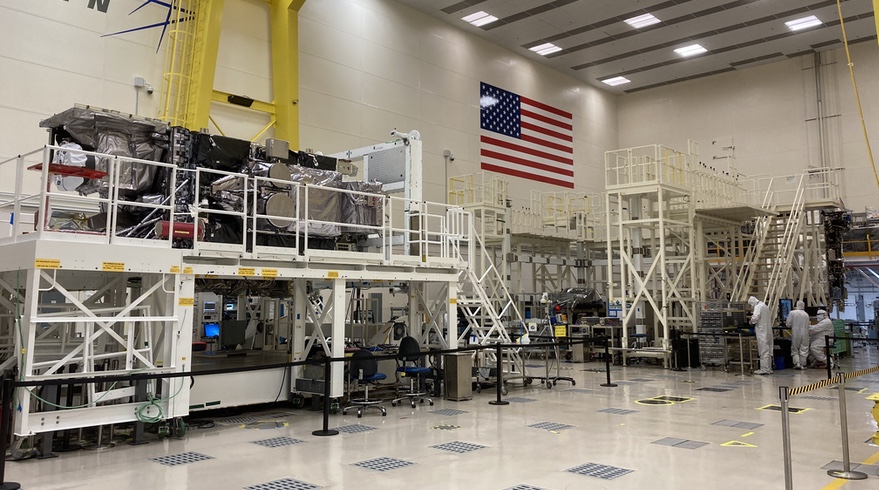WASHINGTON — NASA has selected SpaceX to launch the last in a series of geostationary weather satellites that had previously been launched by United Launch Alliance.
NASA announced Sept. 10 that it awarded a contract to SpaceX for the Falcon Heavy launch of the Geostationary Operational Environmental Satellite (GOES) U spacecraft. The launch is scheduled for April 2024 from the Kennedy Space Center in Florida. The agency said the contract is valued at $152.5 million.
GOES-U is the fourth and final satellite in the GOES-R series of satellites, which monitor terrestrial and space weather from geostationary orbit. GOES-R launched in November 2016 and was renamed GOES-16, operating from the GOES East slot at 75 degrees west in GEO. GOES-S launched in March 2018 and became GOES-17, operating from the GOES West slot at 137 degrees west. GOES-T is scheduled to launch in January 2022 and will replace GOES-17 because of problems with that satellite’s main instrument, the Advanced Baseline Imager.
GOES-R and GOES-S each launched on an Atlas 5, and GOES-T is scheduled to launch on an Atlas 5. The NASA contract announcement did not disclose the reason for selecting SpaceX to launch GOES-U. The value of the GOES-U contract is slightly less than the award made to ULA in December 2019 for the GOES-T launch, $165.7 million.
ULA spokesperson Jessica Rye said the company withdrew its bid to launch GOES-U because it did not have any Atlas 5 vehicles available. “All of the remaining 29 rockets have been sold to customers for future launches so we had to withdraw our bid for NASA’s GOES-U launch service,” she said.
ULA is preparing to transition to the Vulcan Centaur rocket, whose inaugural launch is now scheduled for 2022. Tory Bruno, chief executive of ULA, has said recently the company is no longer offering the Atlas 5 after a final series of contracts announced earlier this year, such as an order for nine Atlas 5 launches by Amazon in April to launch part of its Project Kuiper broadband constellation.
During a panel at the Satellite 2021 conference Sept. 9, Bruno said the company did not expect to order additional Russian-built RD-180 engines used in the Atlas 5 first stage. “I have purchased all the RD-180s we require for the Atlas 5,” he said. “There are 29 Atlases left. All of those RD-180s are safely ensconced in a warehouse in Alabama. I believe that is more than I need to transition smoothly to Vulcan.”
The GOES-U win adds to a growing backlog of Falcon Heavy launches for SpaceX. In July, NASA awarded SpaceX a contract for the launch of the Europa Clipper mission to the icy, potentially habitable moon of Jupiter, also scheduled for 2024. Other NASA awards include the Psyche asteroid mission, the first two elements of the lunar Gateway and the Gateway Logistics Services contract, where SpaceX will use the Falcon Heavy for two launches of Dragon XL spacecraft to transport cargo to the lunar Gateway.
SpaceX also won a Falcon Heavy contract from Astrobotic in April to launch its Griffin lunar lander carrying NASA’s VIPER rover as part of the agency’s Commercial Lunar Payload Services program. Falcon Heavy is part of SpaceX’s National Security Space Launch Phase 2 contract awarded in August 2020, making the vehicle eligible for future national security launches.
Falcon Heavy has launched three times, all successfully, but the last launch was the Space Test Program 2 mission in June 2019. The next Falcon Heavy launch, on a U.S. Space Force mission designated USSF-44, is scheduled for no earlier than Oct. 9.
